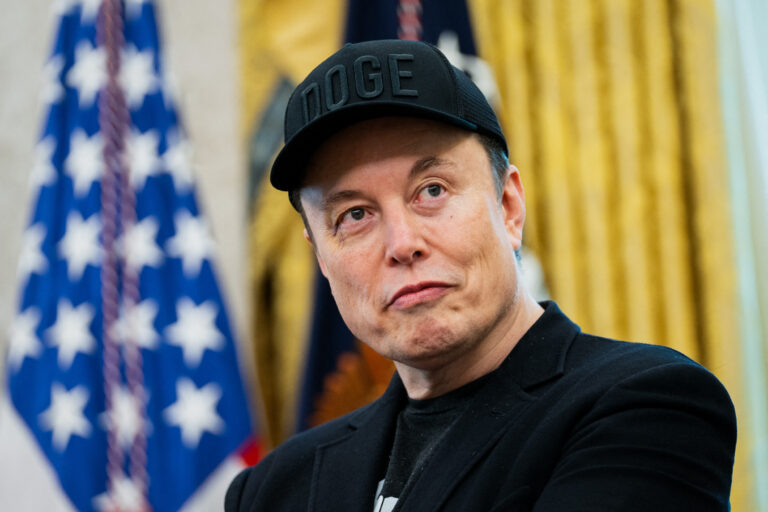Billionaire business owner Elon Musk said he is starting a new political party, which he dubbed the ‘America Party’ in a post on X Saturday.
“Today, the America Party is formed to give you back your freedom,” the post said, citing a poll he had previously posted on the platform.
Why It Matters
Musk was born in South Africa but obtained his citizenship in 2002. He took an increasingly prominent role in politics through his partnership with President Donald Trump during the 2024 U.S. presidential cycle, pumping money into the Republican’s campaign and utilizing his social media platform, X, to promote him.
However, Musk and Trump had a very public fall out after the tech mogul departed the federal government, having spent a few controversial months headlining the effort to reduce “waste, fraud, and abuse” through the Department of Government Efficiency (DOGE). While Musk has walked back some of his more outrageous allegations and attacks, he has persisted with the idea that the U.S. needs a new political party.
Despite the U.S. operating under what’s fundamentally a two-party system, third-party candidates for president are allowed to put themselves on the ballot across the 50 states. All states require a certain number of signatures, which differs by state, to support a candidate’s bid. A large political operation would be needed to gain the necessary traction to actually gain a foothold as a party.

Photo by ALLISON ROBBERT/AFP via Getty Images
What To Know
Musk posted his poll on July 4, writing that “Independence Day is the perfect time to ask if you want independence from the two-party (some would say uniparty) system! Should we create the America Party?”
By Saturday afternoon, he closed the poll, which received just shy of 1.25 million votes, which had 65.4 percent respondents voting “Yes.”
After seeing the results, Musk made a new poll, writing: “By a factor of 2 to 1, you want a new political party and you shall have it! When it comes to bankrupting our country with waster & graft, we live in a one-party system, not a democracy.”
He also reposted a meme of a snake with two heads and the text “End the Uniparty,” a reference to the belief among some Americans that despite having a two-party system, very little actually changes between the Democrats and Republicans in power.
As a foreign-born U.S. citizen, Musk can not run for president, but he could bankroll other candidates, which he could do with a third party. He wrote in a separate post that if he did make a new party, he would focus on capturing two or three Senate seats and eight to 10 seats in the House of Representatives in order to have impact on legislation.
“Given the razor-thin legislative margins, that would be enough to serve as the deciding vote on contentious laws, ensuring that they serve the true will of the people,” he wrote.
And Musk would seemingly have significant support for such a venture: A survey conducted by Quantus Insights between June 30 and July 2 among 1,000 registered voters found that 40 percent of respondents – including many Republican voters – say they would consider voting for a theoretical third-party backed by Musk over traditional Republican or Democratic candidates.
Quantus Insights wrote on X that the poll specifically wanted to see support for a Musk-backed party, but noted that “this kind of question always polls well. In 2023, 63 percent of Americans supported a third party, the highest in Gallup’s 20-year trend.”
Significant doubts also remain whether a third party could actually have meaningful impact: Grant Davis Reeher, a political science professor at Syracuse University, previously told Newsweek there are “several structural hurdles to creating and maintaining a viable third party.”
But even before Musk and Quantus Insights conducted their polls, a separate survey by YouGov published on June 18 found 46 precent of the 3,118 U.S. adults polled believe that a third party is necessary in the current U.S. political landscape, with 47 percent of Democrats and 35 percent of Republicans in support of a hypothetical third party.
What People Are Saying
Kevin Madden, a senior partner at Penta Group, previously told Newsweek: “The reality is that most voters tend to gravitate to their major-party allegiances, leaving a third-party without the funding and organizational manpower to make major progress. The ‘big middle of the American electorate is still the main battleground for winning and losing elections, but it’s not organized to the degree that a third-party movement can be built whole cloth from it.”
Dafydd Townley, an American politics expert at the University of Portsmouth, previously told Newsweek that “third parties do not tend to have a long lifetime in American politics,” adding that Musk’s new party “would likely split the Republican vote, potentially resulting in a Democrat-dominated House of Representatives, at least in the short term, due to the winner-takes-all electoral system.”
Update 7/5/25, 4:27 p.m. ET: This article has been updated with additional information.


